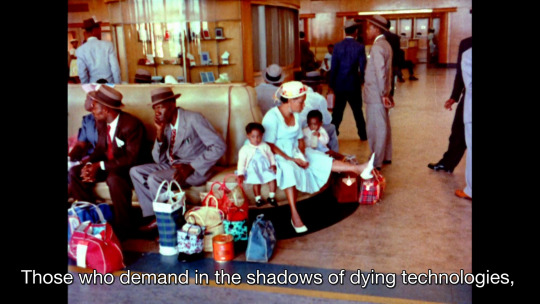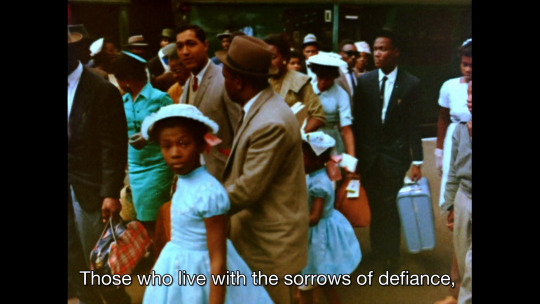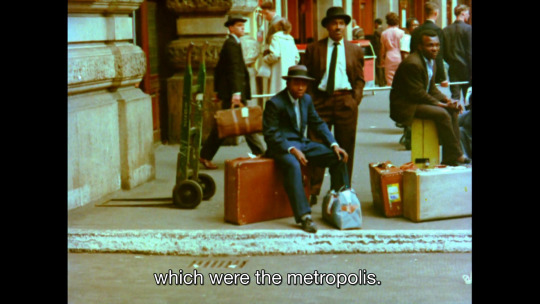#mark fisher
Text






moodboard
8K notes
·
View notes
Quote
The neoliberal era — the time when, we were repeatedly told, there was no alternative — has been characterised by a massive deterioration of social imagination, an incapacity to even conceive of different ways to work, produce and consume. It’s now clear that, from the start (and with good reason) neoliberalism declared war on this alternative mode of time. It remains tireless in its propagation of resentment against those few fugitives who can still escape the treadmill of debt and endless work, promising to ensure that soon, they too will be condemned to performing interminable, meaningless labour — as if the solution to the current stagnation lay in more work, rather than an escape from the cult of work. If there is to be any kind of future, it will depend on our winning back the uses of time that neoliberalism has sought to close off and make us forget.
k-punk: The Collected and Unpublished Writings of Mark Fisher (2004-2016)
1K notes
·
View notes
Note
In a different ask about Mark Fisher, you mentioned that he “…had some reactionary tendencies that you can see in, for example, the way he talked about 'depressive anhedonia' and what that reveals about his attitude toward pleasure. many such cases on the academic left.” Can you elaborate on this and why do you think it is so prevalent on the academic left?
i guess the more accurate way i would rephrase myself is that this is an attitude common to the overculture and consequently to academia, but that i find to be particularly hypocritical when it comes from people styling themselves as 'leftists'—broadly speaking there's a real fear that 'excessive' pleasure or leisure (this is often conflated with the procurement of luxury consumer goods) is morally corrupting, distracts from or hinders political action, arrests personal growth, &c. often this idea of a coddled, pampered, pleasure-ridden younger generation is explicitly counterposed to a reactionary fantasy of past generations of 'hard workers' who performed physical labour or didn't have ipads or whatever the issue du jour is. it's bad analysis because it blames the nebulous idea of 'too much enjoyment' for what are actually real and pressing political issues: for example, whose labour made the ipad and under what conditions?
there's a huge & critical difference between saying that the procurement of luxury consumer goods for global northerners is predicated on imperial exploitation of the global south, and saying that the goods are simply 'bad', metaphysically, because they make life too enjoyable and people too soft. it comes out of a tendency among academics to a) ignore, minimise, or just not think about imperialism in their attempts to critique capitalism and b) treat the superstructural effects (culture, ideology, psychological experience) as though they are the causal factors, leading to sloppy lazy 'moral degeneracy' theorising that does nothing to liberate anyone and instead just thinks itself into a pit of condescending despair.
365 notes
·
View notes
Text
The reason that focus groups and capitalist feedback systems fail, even when they generate commodities that are immensely popular, is that people do not know what they want. This is not only because people’s desire is already present but concealed from them (although this is often the case). Rather, the most powerful forms of desire are precisely cravings for the strange, the unexpected, the weird. These can only be supplied by artists and media professionals who are prepared to give people something different from that which already satisfies them; by those, that is to say, prepared to take a certain kind of risk.
Mark Fisher, Capitalist Realism
465 notes
·
View notes
Photo

Mark Fisher, Ghosts of My Life Writings on Depression, Hauntology and Lost Futures
3K notes
·
View notes
Text

I redrew the cover to one of my favorite albums Tin Drum by Japan
#furry art#my art#oc#furry#yay#japan#David sylvian#Mark Fisher#tin drum#dog furry#synthpop#new romantics
69 notes
·
View notes
Text

Happy birthday, Mark Fisher! (July 11, 1968)
A left-wing writer, theorist, and cultural critic, Mark Fisher was born to a working class family in Leicestershire, England. He studied at Hull University and the University of Warwick, where he earned his PhD in 1999. He first gained prominence by blogging as "k-punk" in the early 2000s, receiving acclaim for both style and substance. Fisher's most famous and celebrated work is Capitalist Realism: Is There No Alternative? which popularized the term "capitalist realism" to refer to the cultural hegemony enforced by capitalist society and culture, in which capitalism is viewed as the only coherent and sensible form of socioeconomic organization which is capable of existing. Having long struggled with depression and with increasingly deteriorating mental health, Fisher committed suicide by hanging on January 13, 2017.
“Capital is an abstract parasite, an insatiable vampire and zombie maker; but the living flesh it converts into dead labor is ours, and the zombies it makes are us.”
370 notes
·
View notes
Text
“Needless to say, what counts as ‘realistic’, what seems possible at any point in the social field, is defined by a series of political determinations. An ideological position can never be really successful until it is naturalized, and it cannot be naturalized while it is still thought of as a value rather than a fact. Accordingly, neoliberalism has sought to eliminate the very category of value in the ethical sense. Over the past thirty years, capitalist realism has successfully installed a ‘business ontology’ in which it is simply obvious that everything in society, including healthcare and education, should be run as a business. As any number of radical theorists from Brecht through to Foucault and Badiou have maintained, emancipatory politics must always destroy the appearance of a ‘natural order’, must reveal what is presented as necessary and inevitable to be a mere contingency, just as it must make what was previously deemed impossible seem attainable.”
— Mark Fisher, Capitalist Realism
277 notes
·
View notes
Text










John Akomfrah / Black Audio Film Collective
- Handsworth Songs
1986
#Handsworth Songs#John Akomfrah#Black Audio Film Collective#british film#documentary#experimental film#1986#hauntology#Mark Fisher
355 notes
·
View notes
Text
Imagine any record released in the past couple of years being beamed back in time to, say, 1995 and played on the radio. It’s hard to think that it will produce any jolt in the listeners. On the contrary, what would be likely to shock our 1995 audience would be the very recognisability of the sounds: would music really have changed so little in the next 17 years? Contrast this with the rapid turnover styles between the 1960s and the 90s: play a jungle record from 1993 to someone in 1989 and it would have sounded like something so new that it would have challenged them to rethink what music was, or could be.
- Mark Fisher, Ghosts of My Life
83 notes
·
View notes
Text

Depression is not sadness, not even a state of mind, it is a (neuro)philosophical (dis)position
Capital demands that we always look busy, even if there's no work to do. If neoliberalism's magical voluntarism is to be believed, there are always opportunities to be chased or created; any time not spent hustling and hassling is time wasted. The whole city is forced into a gigantic simulation of activity, a fanaticism of productivism in which nothing much is actually produced, an economy made out of hot air and bland delirium.
55 notes
·
View notes
Note
just throwing shit at the wall do you know any good marxisr critique of terf ideology or will i have to make that myself?
My first thoughts are Leslie Feinberg and Judith Butler, though they're not especially recent. But arguably that's a relevant point, because it asserts that we've been dealing with fascists and transphobes for awhile, and the current reactionary wave is just fash scrambling for an enemy to mobilise a popular movement. Butler also gave an interview a couple years ago in which they explicitly identified TERFs as fascist (“Anti-gender ideology is one of the dominant strains of fascism in our times”) which was subsequently censored by the Guardian. Worth a read (both the original and the PinkNews call out of the censorship). There's also a book called Transgender Marxism, which I have not read and will therefore not endorse, but if anyone wants to give it a look and let me know what's up, I'd be grateful.
Idk, as a Marxist I do really think the problems we face are sort of always the same and just slightly changing their stupid face. I still recommend Frederic Jameson and Mark Fisher as the best sources to confront the digital age. Liberalism/fascism is 'agile', that's why you see rainbows in the midst of genocide and memes in the midst of mass layoffs. But, as one of our best once said, we're dialectical materialists. And we deal with what reality is, whether we like it or not.
#Leslie Feinberg#Judith Butler#transgender marxism#transgender liberation#trans#marxism#Frederic Jameson#Mark Fisher#Fred Hampton#transgender#original#Marxist#ask
59 notes
·
View notes
Quote
The reason that it’s so easy to whip up loathing for “benefit scroungers” is that — in the reactionary fantasy — they have escaped the suffering to which those in work have to submit. This fantasy tells its own story: the hatred for benefits claimants is really about how much people hate their own work. Others should suffer as we do: the slogan of a negative solidarity that cannot imagine any escape from the immiseration of work.
k-punk: The Collected and Unpublished Writings of Mark Fisher (2004-2016)
2K notes
·
View notes
Note
what are your thoughts on fishers capitalist realism and how do you think it’s useful as a framework?
fisher is useful for pointing out that the realist attitude toward capitalism is neither inevitable nor transhistorical---ie, that it takes a massive economic effort to maintain capitalism just as it takes a massive superstructural cultural effort to maintain belief in its efficacy and necessity. specifically, fisher was theorising the way capital is presented as over-and-above human agency in the neoliberal epistemology, which doesn't tend to appeal to god or a divine right of kings in the way that eg 18th-century european capitalists did. what 'capitalist realism' helps elucidate is that, even in this neoliberal order that is often presented as being efficient, rationalised, & stripped of metaphysics, we are still being fed a trick whereby an immanently created social force is paraded around as a transcendent truth of human existence. the corollary is of course that revolution is possible and capitalism can topple.
that said, this type of analysis really wants more historicisation than fisher provided (the foucault problem) and i also find that the book's weakest points come in his analyses (polemics, really) on the psychological effects of capitalist society. these lines are often quoted and usually snappy, but they're not really grounded on much (again, many of his assertions demand historicisation) and are frequently extremely narrowly focussed on middle-class white-collar workers---which, a) haven't we heard enough about this demographic at this point and b) he'll try to extrapolate from there to a general analysis, like when he jumps from observations of his own university students to assertions about the general psychological cost of neoliberalism---but can we really assume the alienation of a 19 y/o uni student (who probably still has more access than the average person to upward economic mobility) is the same as, or generalisable to, the alienation of all working poor? i also think fisher had some reactionary tendencies that you can see in, for example, the way he talked about 'depressive anhedonia' and what that reveals about his attitude toward pleasure. many such cases on the academic left.
302 notes
·
View notes
Text

From “Is It Me or Society? I Can’t Tell:” Memphis Hip-Hop and the Slow Cancelation of the Future" by Walker Armstrong
38 notes
·
View notes
